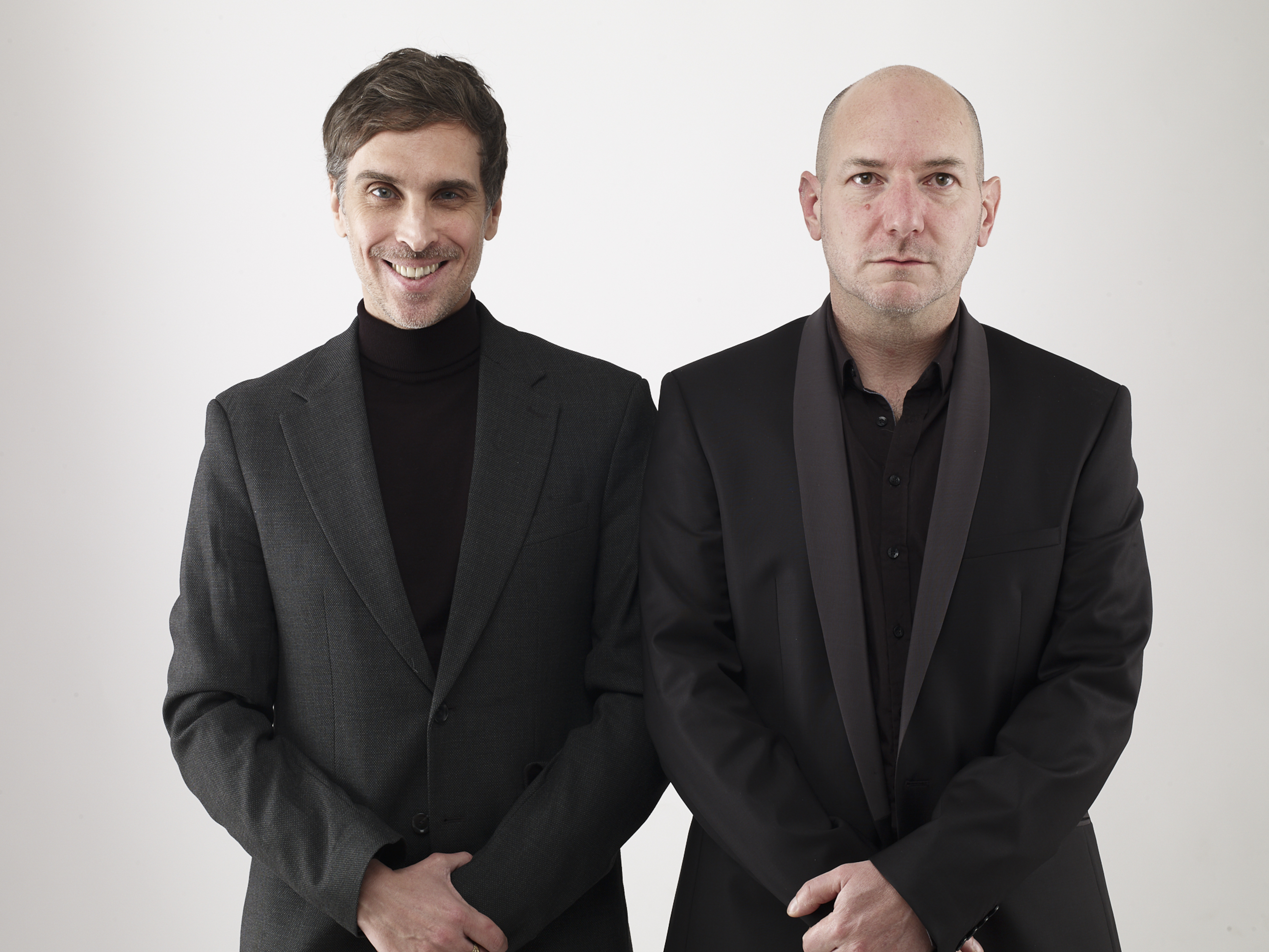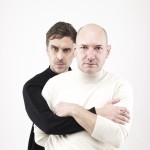 In musical circles there is the – not at all unrealistic – myth of the difficult second album, with which, in contrast to a debut that benefits from all sorts of surprise effects, one inevitably reacts to certain expectations, not to mention the question of whether the musician’s fund of ideas is still enough to create something new and relevant. Of course, things are different when almost a quarter of a century of time has passed between the first and second albums – a time in which the old merits are no longer alive in everyone’s memory and a lot of new ideas have accumulated. It was something like that with L’Eglise du Mouvement Péristaltique Inversé, the duo founded shortly after the millennium by the singer and producer Nicolai Riccardo Gray (known as Nick Gray as a soloist and bandleader) and the guitarist Charles Pietri, who in recent years has worked, among other things, as a photographer. A few weeks ago, their second long player “Le Peintre du Soir” was released, whose catchy and at the same time experimental style, somewhere between retro-leaning pop and wave, dark dystopian rock elements and dramatic lyrics, has the maturity of a magnum opus and the freshness of a debut. Since the album is rich in references and false bottoms, there was enough material for this interview, in which we learn, among other things, that L’Eglise du Mouvement Péristaltique now exists twice.
In musical circles there is the – not at all unrealistic – myth of the difficult second album, with which, in contrast to a debut that benefits from all sorts of surprise effects, one inevitably reacts to certain expectations, not to mention the question of whether the musician’s fund of ideas is still enough to create something new and relevant. Of course, things are different when almost a quarter of a century of time has passed between the first and second albums – a time in which the old merits are no longer alive in everyone’s memory and a lot of new ideas have accumulated. It was something like that with L’Eglise du Mouvement Péristaltique Inversé, the duo founded shortly after the millennium by the singer and producer Nicolai Riccardo Gray (known as Nick Gray as a soloist and bandleader) and the guitarist Charles Pietri, who in recent years has worked, among other things, as a photographer. A few weeks ago, their second long player “Le Peintre du Soir” was released, whose catchy and at the same time experimental style, somewhere between retro-leaning pop and wave, dark dystopian rock elements and dramatic lyrics, has the maturity of a magnum opus and the freshness of a debut. Since the album is rich in references and false bottoms, there was enough material for this interview, in which we learn, among other things, that L’Eglise du Mouvement Péristaltique now exists twice.
You’ve just released an album named “Le Peintre du Soir” and many of our readers may encounter your band now for the first time. Actually, however, this album is your second one, because you had your debut some 21 years ago. Could you introduce the two members of your band and your background to us?
Nicolai: 22 years ago to be precise, as our first album was released in 2001 on the Parisian label Brume Records. We still occupy the same functions in this project as back then: Charles plays the guitar, I sing and play synths. Individually, I have also published a certain number of records under the name Nick Grey, by myself or with collaborators, between 2003 and 2015.
Charles: I hadn’t touched a guitar in 22 years. It was carefully kept in its case while awaiting the band to get together again. During this time, I devoted myself to other projects, particularly in the field of photography.
Have you been in close contact also during your long break as a band? if I remember it correctly, Charles also participated in some of the Nick Grey and the Random Orchestra releases..
Charles: Indeed, I worked on “Regal Daylight”, Nick Grey’s first album, and recorded some guitar parts. But I think that my guitar playing, rather minimal if not lazy, didn’t really fit with the evolution of the project. Later on, various life events also meant that I had to put music aside.
Nicolai: You played on the “Candlelight Eyes” EP, too, which was released in a very limited format but remains one of my favourite Nick Grey records.
Which were the impulses that brought you to revive L’Eglise?
Nicolai: We met again two years ago for a more solemn occasion than the others, in the presence of other people as well, and we talked about the past in a more frontal manner. Very quickly the sentence fell: “Let’s record a second album twenty years after the first”. I believe that this time, two elements made it possible to “seal a pact”: firstly the presence of third parties, who forced us to take responsibility for what we were announcing, and then also a matter of temporality. It was just too good to release the difficult second album twenty years after the first. Then, everything happened at an astonishing speed: we recorded around ten songs in a few weeks, contacted Ian Caple who enjoyed our music and agreed to (beautifully) mix the album, etc. I think that this clear acceleration can be felt a little in this second disc, which has the freshness but also the imperfections of a first record.
Charles: I would even say that this record combines several roles: it is both a second first album since we are re-starting from scratch, but also a second album in a true sense since it is a continuation of the previous one. It is also the album of our maturity, as its foundations are solid, there was some more mastery of the direction in which we wanted to go, and also maturity in a quite literal sense because we are old now.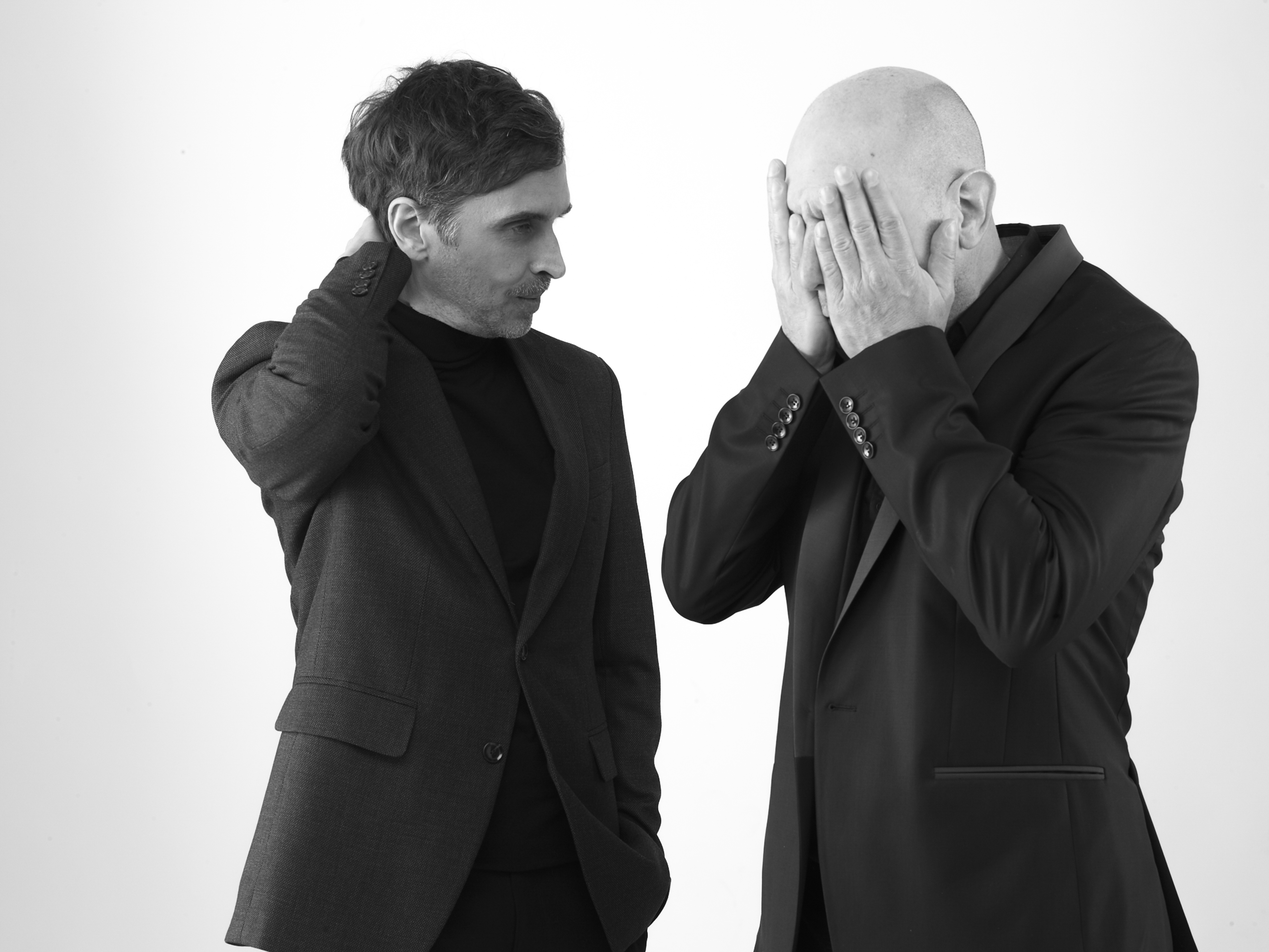
Did you write and produce all the songs together, or was it more like one of you came up with an idea and the rest came about step by step?
Nicolai: If that’s okay with you, I think we should leave the curtain pulled on our internal functioning – not out of vanity, but maybe because of some form of archaic superstition. Let’s just say our work method is based on friendship. We have always operated like this. Charles is someone who is extremely intuitive in addition to being talented: communication is always fluid. When a conflict emerges, it is stifled, dissolved or diluted by the use of a rite. This rite can take the form of a cooking competition, a duel (to avoid any advantage, we favour distasteful instruments that none of us have mastered, like the flute or the didgeridoo), or, if we feel in a particularly virile mood, arm wrestling. This last option, however, presents a problem: as our muscles are underdeveloped, we have to recruit sailors or mountaineers who resemble us physically to do the arm wrestling business for us. It’s a costly, long and difficult procedure to put into place – especially since we are also bad cooks and even worse at the didgeridoo – which is why we generally prefer to avoid conflicts.
Charles: I’ve been offering to settle conflicts with rock-paper-scissors for years but haven’t been successful yet. I hope that one day I can convince him to make a cover album using only rocks and a pair of scissors.
Nicolai: Before that we should record your jazz opera project The primitive flies of Saturn which you mentioned to me in Copenhagen around 2009.
Charles: …More seriously, the creative process for this record happened quite naturally: talking was a key part of the process. We aren’t the Gallagher brothers, throwing cans of warm beer at each other in the studio, we prefer to sit and chat while eating good cheese. To convince him of the merits of a guitar element, I just have to hand him a juicy piece of Brie.
Did your approach to music and creativity change much over the years and did you notice this while working on the new songs?
Nicolai: We always remark the most obvious in hindsight. What I’ve noticed in the way we function was there was a lot of pleasure involved – the pleasure of working with Charles on these dark and strange pieces.
Charles: I think this long break has helped streamline the way we operate. There has been a lot of talking between us before the start of the creative process, to make sure that we had the same vision of the project: the goal is now just to enjoy making music together, on recordings and live. As the foundations are healthy, it is very easy to let ourselves go creatively.
Your sound is primarily based on electronics and guitar and your musical style combines pop qualities with a joy of experimentation – so much for the typical music journalist phrases… Did you have an idea beforehand about what you wanted the album to sound like, or did it all come about just as you worked on it?
Nicolai: What is a bit paradoxical is that after waiting twenty years, we were in a complete rush to write and record this album. There was something very instinctual at the time of its creation: the songs had to come out. So no, there wasn’t any pre-made intention, we were astonished to see the whole thing emerging and taking form so quickly. That said, you are correct: the joy of experimentation is absolutely present between us, and it is precisely this joy that finds a translation in the more “pop” sounds of our music.
Charles: Our respective musical landscapes have evolved over the last twenty years. Although there is a common base, we tend to try to pull the songs in separate directions. Sometimes my guitar can give an unexpected twist to a piece. I’m thinking in particular of Le Bleu du Ciel which was quite pure and dry in its earlier stages, and then I came in with my guitar pouring out waves like sad whipped cream.
In Germany we tend to call French music which is reminiscent of the early eighties and a bit dark immediately Cold Wave, which is often too much of a generalisation. Are you comfortable with such terms or do you find them limiting?
Nicolai: It doesn’t bother me, we ended up labelling ourselves with the tag “cold pop” because a decision had to be made. Of course, we are not a “cold pop” band. But this general marker has no real meaning other than to serve as a first entry point. Then it’s up to everyone’s interpretation to do their work.
Charles: I don’t agree with that, we are very “cold pop”. Even on less obvious pieces like Cloaque et Empire or Cadavérologie du couple, we want people to dance. In a more or less pronounced manner of course, but there is a desire to remain catchy even in the most experimental moments of the record.
Nicolai: Don’t ever say we’re “cold pop” again or I’m bringing out the didgeridoo. But yes, Charles is right, we are not an art-rock band, if we fail to communicate our pleasure to the listeners, we fail at everything.
I’m not sure if it’s because Nick recites rather than sings in many of the tracks, but intuitively, many of the songs reminded me of dramatic monologues that could come from the theater or an experimental film. Can you relate to this association?
Nicolai: Certainly, there is a very theatrical dimension to the project: EMPI is “another stage” installed on the main stage. The spectator is of course free to accept this artistic displacement, or to refuse it.
Charles: The music is quite cinematic, each song has its own visual universe, its colours, even its smell. Alexandre is earthen, a heavy step on damp clay while Triptyques de Monarques Assis is a slow slide on a freshly polished floor.
The opening song “Alexandre” for instance reminds of an ambigious dramatic monologue of a person struggling with a lot of things (and probably also with a role he plays). This even more in the video, where Nick acts as an exhausted persona who is being made up by Charles. What sort of character is this Alexandre and what is he worrying about in his tirade?
Nicolai: Alexandre is a character in search of shelter, of a vault: as long as he does not find one, he will spread corrosion on his path. Where does his halo of threat come from? Alexandre knows that the line between shelter and custodial setting is thin, so he must resist his own limits and frailty. He marches on, occasionally resting on his long cane. A shelter is political space, a protection against death, a fragile border between rest and sleep – two systems ruled by the same mechanics. Alexandre knows that rest, when it is imposed, becomes a mortal danger, so he is forever on the lookout, wandering. Alexandre does not sleep. Insomnia is a much safer haven for the spectres of his unshut world.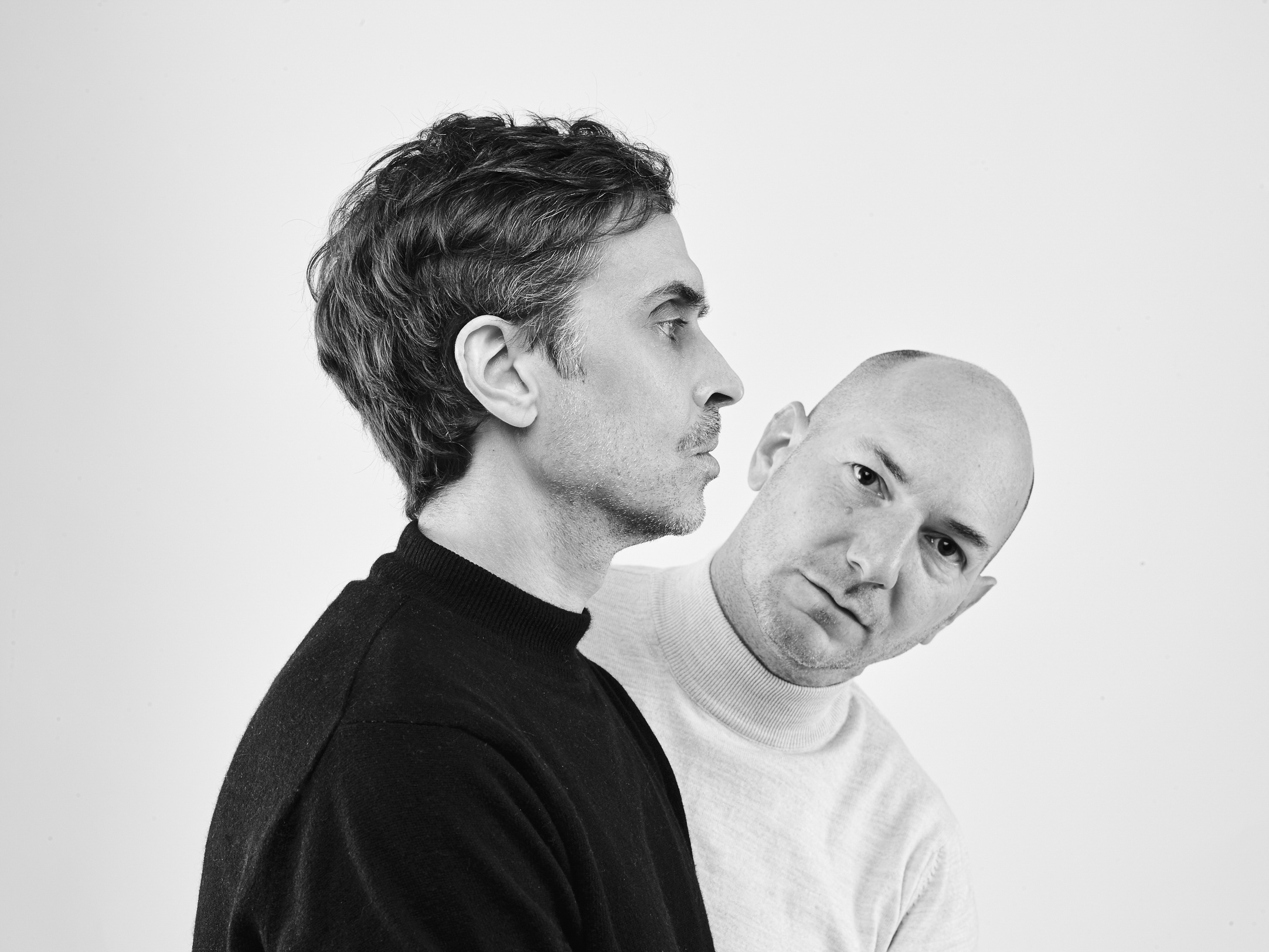
In the song “Le Bleu du Ciel” we meet characters from the novel of the same name by Georges Bataille. It’s been a long time since I read the book, but what I still remember well is the abysmal and exhausted mood in Europe just before the Second World War. Which aspects of the book inspired you most?
Nicolai: This is the second time already I’ve heard you use the word “exhausted”. Are you yourself very tired ? I’m sorry if you are. Coffee has very little effect on me either. But I was recently told of the merits of something called guarana. I had to stop Redbull though, that stuff messed me up. To answer your question: perhaps the character of Lazare. However, the Lazare of the book isn’t the Lazare of our song, for a variety of reasons including the most obvious one – gender –, although there are similarities as well.
Would you say that there are parallels between today’s societies and the setting depicted in Bataille’s novel? Or would you rather regard it as a timeless parable?
Nicolai: If I understand your question correctly, you are asking me if we now have slipped into some form of Sadean society? if the last barriers from the XXth century – censorship, repression, etc. – ensuring the stability of the symbolic order have finally been dissolved, giving way to a universal outbreak of perversion? I don’t think so. On the contrary, it seems to me that we live in a rather binary and moral era: for instance, social networks are very powerful generators of normative injunctions. In that sense, I would say that the themes of Bataille’s novel are timeless, yes, as writing can be, even if the term of parable does not quite suit me.
Who is actually the speaker in that song? I ask this mainly because Nick sings in an artificial falsetto voice?
Nicolai: It’s a song about mourning, or, should I say, mournings — because as you may know, one mourning always hides another. And yet it is an infinite litany of imaginary mournings that constitutes the essence of our love. Whereas mourning causes corrosion, a rupture of balance, on the other hand our romantic idea of death – always there, permanent and circular – proposes a return to uterine calm. Here is a quote not by Bataille but from Flaubert’s Novembre, which highlights the way in which the almost mystical power of writing responds to the instinctual chaos of adolescence: “I was born with the desire to die”. Our song Le bleu du ciel pays homage to this feeling, to the tears and the tremors under the disco ball.
There seem to be quite a number of literary references in the album, hints to fiction (besides Bataille also Margarite Duras), psychoanalysis (Freud, Lacan) and probably even more. Do you think that these voices from 20th century intellectual history are somehow exotic in today’s age of Life Coaching and the TikTok academia (and therefore seriously filling a gap)?
Nicolai: I am not fond of the current ideology of decline that currently reigns. Declinologists are all around these days! Some say there is a generalised impoverishment of contemporary social bonds that places humanity on the edge of the precipice of idiocy. We need to apply some nuance to this analysis, even if the rather terrifying political climate makes this a bit tricky. Each era remains culturally rich, and at the same time the voices of the past appear much more than simple historical landmarks. As we get older, there seems to be a moment when the call of the well-known arises: we are then tempted to listen to Keane’s “Something Only We Know2 on repeat until the end of our days and to reject everything that is new. We just need to be sure whether we want to accept this moment of passage or to refuse it. However, I agree with you on the catastrophe that is the ideology of “life coaching” : nothing good can emerge when personal, subjective trajectories collide with managerial logic.
Charles: Idiots didn’t wait for the 21st century to exist. The problem probably comes from the fact that some people try to monetize this idiocy, this non-productive part of the brain. If we accepted our right to be idiotic, we would be so happy.
For me, the song “Cadaverologie du Couple” is one of the highlights of the album with its hypnotic rhythm and the almost aggressive list of paragraphs; the lyrics seem to be about the psychological abysses of a relationship dispute. What kind of story is happening there?
Nicolai: Relationships are a form of madness, yes? This is why socially, we invent concepts that try to provide some structure, but in reality add to the confusion – such as love or friendship – to try to hold it all together through the power of meaning, arbitrary meaning. So obviously, when these imaginary constructs collapse, the effects can be significant. Some of these effects are poetically described in this song.
How integral would you describe the artwork by Lysandre Cottret, are these portraits parts of a series?
Nicolai: Lysandre Cottret is a painter based in Marseille. Her painting is a mixture of realism juxtaposed with the simplicity of solid colours: she plays with light and shapes to create an impression of bodies floating in space as if her subjects were fragmented by their environment. We asked her to create the cover for Le Peintre du Soir (which is her self-portrait), as well as those of our first two singles (which are our own portraits). From the description that I have provided to you here, you will not have trouble imagining why the meeting of our two universes made sense to us. Her paintings, and particularly her portraits, are haunting. Please check her Instagram here: @lysandre.c
Was L’EMPI never a topic for you both during the twenty years hiatus? Or were there times, when you had thoughts like “if we did an album this year it would sound like this and that”? Do some phantom albums exist in your imagination?
Charles: We have only mentioned EMPI twice: the first in 2001 in a public garden in Clermont-Ferrand when the group was actually formed, and the second time in 2022 in the Lyon countryside which was the starting point of our second album. In the meantime, the subject has never been raised. We preferred to talk about other things.
Nicolai: No, you perfectly summed up how things have developed between the two of us over these last two decades. Dozens of strange ghost albums do exist, and will never be recorded because they are honestly unreasonable.
Charles: Don’t listen to him, he lies through his teeth.
If that’s not too much of an off-topic, is Nick Grey and the Random Orchestra a completely closed chapter now?
Nicolai: The Random Orchestra is disbanded, yes, but Nick Grey is simply mummified. And everyone knows what can happen to mummies. Or maybe not, actually. Let’s check it out on Wikipedia! We learn things immediately: “The first living mummies in fiction were mostly women, presented in a romantic and sexualized light, often as the romantic interest of the protagonist, which could metaphorically represent sexualized orientalism and a colonial form of romanticization of the Orient.” Well, it turns out that Nick Grey is absolutely not a mummy after all. Let’s take back this mummy stuff, shall we? Let’s just say we don’t know what the future holds. However, I can announce to you now that at the end of 2024, the entire Nick Gray backlog will once again be available in digital format, as well as the entire 230 Divisadero discography, my work with Matthew Shaw. Each disc has also been remastered by Peter James. It was time to make these records available again.
I’m not really good at French, but as far as the titles (and also the band name) tell, an interest in the human body, it’s diseases and the sometims weird medical terms for it was one major focus in the earlier recordings. Did these motifs simply occur while interacting, or do they go back to a particular story?
Nicolai: You have to learn French, old man. We learned German after all! Take a look: “Die Menschen haben sich nicht damit begnügt, das Komische zu geniessen, wo sie im Erleben darauf stossen, sondern danach gestrebt, es absichtlich herzustellen, und man erfährt mehr vom Wesen des Komischen, wenn man die Mittel studiert, welche zum Komischmachen dienen ”.
Charles: Even if I have nothing to do with the lyrics of the songs, I connect with this interest in the body as an interface. I studied Cronenberg’s early films in my youth, where the body is a real obsession, in its mutations, deformations, stigmata. Videodrome is truly wonderful.
Nicolai: But you are right to point out the body as a point of interest, a zone of borders, meanders, interstices and functions, but also where subjectivity can emerge. The quote from Freud above didn’t fall from the sky, so to speak. And as the role we assume here is “artistic” – with a huge grain of salt and the necessary “air quotes” – rather than medical, our point of view is not purely descriptive. We shuffle, we prowl, we sidestep.
If you could name a major combining element between the two albums, a bridge across those twenty years, which one would you both name?
Some say that bands function best when the members have less tastes and influences in common. How is it in your case and which sorts of music are you into these days?
Charles: We have some common references but we listen to very different things. For the past few months, I’ve been obsessed with No Decent Shoes for Rain by Dry Cleaning. I really operate by obsession, I listen to certain songs and wear them out to the bone, like Pre Language by Disappears which I can listen to on repeat a hundred times in a row on the road. Each instrument plays its little song in its own corner and forms a whole which is quite…
Nicolai: Sorry, I have to interrupt for one second: I need to return to Something Only We Know by Keane. Obviously you’re going to tell me that it is a terrible song, deplorable even, that it has no right to be discussed here, that it is the only song for which the band Keane is known, and that despite even this immense success, almost no one today, outside the borders of England, almost no one actually remembers the band Keane. I will answer that I both agree with you but also disagree. A few weeks ago, Charles and I were eating a relatively spicy Asian dish together and I suddenly had the irrepressible desire to listen to this song, this Keane song that I’m talking to you about here. At that moment, with my mouth full of teriyaki sauce and relative spices, I can assure you that it was the most beautiful song in the universe, a song that managed to perfectly capture the moment of melancholia: this song is a cycle, a game of fort-da that reminds you that everything you love, you have already lost, and therefore are condemned to be able to grasp again only through series of symbolic substitutes. And of course, the subtlety comes from the fact that the content of the song may well be a secret (Something only we know : what is it? What is the secret?), its form is no less bombastic: it is a secret shouted and proclaimed. A secret left in plain sight, in a way. Otherwise apart from that, to answer you, I believe that the members of a group can exist in good harmony if they agree on the fact that Megadeth has always been superior to Metallica.
Charles: We can’t be so categorical about groups that have such uneven discographies. Certainly, Rust In Peace – especially Holy Wars – remains a reference but Master of Puppets is more listenable than some bad Megadeth albums. It is therefore appropriate to carefully analyse all elements before being so assertive, even if I still share your opinion on the whole.
Nicolai: Megadeth may be uneven, but Metallica is consistent in their mediocrity, and always have been. Except perhaps with Lulu, their only good record.
A propos these days – would you say that L’Eglise is finally here to stay? What’s on your list of plans for the nearer future?
Nicolai: I’ll tell you an anecdote. It was around 2007 or 2008, a number of years already after the release of our first album. I had received a letter – a real letter, by post – from a young man hospitalised in a psychiatric hospital. This letter began as follows: “Since you no longer seem to care about L’Eglise du Mouvement Péristaltique Inversé, I would like to inform you that I am taking over your Church.” Naturally I do not know if this project was completed, and if there actually exists an Eglise du Mouvement Péristaltique Inversé parallel to ours nowaday, even more underground, known only to its creator, but this letter highlights two things in my opinion. First of all, the capacity of the artistic function to serve as mediation: between this young man and us, something was able to pass, initially through an artistic interface, then through a simple letter, a “communiqué”. And then, another thing too: at the time, L’Eglise du Mouvement Péristaltique Inversé no longer existed for me except as a memory, a trace of the past, an experience shared with a few friends. But some memories have a surprising vitality which allow them to avoid ending up in the crypt of oblivion: this is how the memory of L’Eglise du Mouvement Péristaltique Inversé has always remained not far from the surface, regularly revived by a reminder of everyday life — like this letter. And to finally answer your question, yes, this time we are here to stay. Many thanks for this interview!
Charles: That’s a great way to conclude.
Our second album Le Peintre du Soir has just been released, and a vinyl version will be available by the end of 2024. 2025 will hold other surprises which are already planned. We will reveal them as we go along.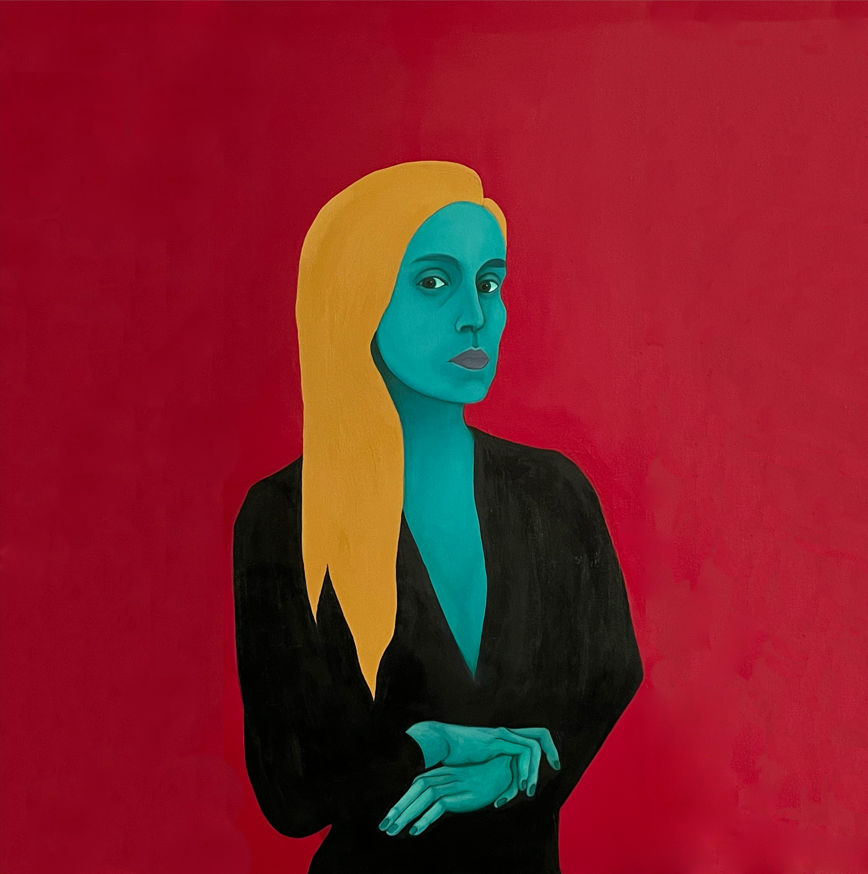
Peristaltique @ Instagram | Linktree
Fotos: Michel Lange, Cover: Lysandre Cottret
Interview: U.S.

